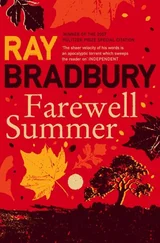Her routine varied in no detail. She lived alone with a house full of rococo pictures, a dusty library, a yellow-mouthed piano, and a music box which, when she ratcheted it up and set it going, prickled the air like the bubbles from lemon soda pop. Miss Bidwell had a nod for everyone walking by, and it was interesting that her house had no front steps leading up to its wooden porch. No front steps, and no back steps, for Miss Bidwell hadn’t left her house in forty years. In the year 1909, she had had the back and the front steps completely torn down and the porches railed in.
In the autumn—the closing-up, the nailing-in, the hiding-away time—she would have one last lemonade on her cooling, bleak porch; then she would carry her wicker chair inside, and no one would see her again until the next spring.
“There she goes,” said Mr. Widmer, the grocer, pointing with the red apple in his hand. “Take a good look at her.” He tapped the wall calendar. “Nine o’clock of an evening in the month of September, the day after Labor Day.”
Several customers squinted over at Miss Bidwell’s house. There was the old lady, looking around for a final time; then she went inside.
“Won’t see her again until May first,” said Mr. Widmer. “There’s a trap door in her kitchen wall. I unlock that trap door and shove the groceries in. There’s an envelope there, with money in it and a list of the things she wants. I never see her.”
“What does she do all winter?”
“Only the Lord knows. She’s had a phone for forty years and never used it.”
Miss Bidwell’s house was dark.
Mr. Widmer bit into his apple, enjoying its crisp succulence. “Forty years ago, she had the front steps taken away.”
“Why? Folks die?”
“They died before that.”
“Husband or children die?”
“Never had no husband nor children. She held hands with a young man who had all kinds of notions about travelling. They were going to be married. He used to sit and play the guitar and sing to her on that porch. One day he just went to the rail station and bought one ticket for Arizona, California, and China.”
“That’s a long time for a woman to carry a torch.”
They laughed quietly and solemnly, for it was a sad admission they had made.
“Suppose she’ll ever come out?”
“When you’re seventy ? All I do every year is wait for the first of May. If she don’t come out on the porch that day and set up her chair, I’ll know for sure she’s dead. Then I’ll phone the police .
“Goodnight,” said everyone, and left Mr. Widmer alone in the gray light of his grocery shop.
Mr. Widmer put on his coat and listened to the whining of the wind grow stronger. Yes, every year. And every year at this time he’d watched the old woman become more of an old woman. She was as remote as one of those barometers where the woman comes out for fair weather, the man appears for bad. But what a broken instrument, with only the woman coming out and coming out alone, and never a man at all, for bad or for better. How many thousands of July and August nights had he seen her there, beyond her moat of green grass, which was as impassable as a crocodile stream? Forty years of small-town nights. How much might they weigh if put to the scale? A feather to himself, but how much to her ?
Mr. Widmer was putting on his hat when he saw the man.
The man came along the street, on the other side; an old man, dim in the light of the single corner street lamp. He was looking at all the house numbers, and when he came to the corner house, Number 11, he stopped and looked at the lightless windows.
“It couldn’t be,” said Mr. Widmer. He turned out the light and stood in the warm grocery smell of his store, watching the old man through the plate glass. “Not after this much time.” He shook his head. It was much more than ridiculous, for hadn’t he felt his heart quicken at least once a day, every day, for four decades whenever he saw a man pass or pause by Miss Bidwell’s? Every man in the history of the town who had so much as tied a shoelace in front of her locked house had been a source of wonder to Mr. Widmer.
“Are you the young man who ran off and left our Miss Bidwell?” he cried aloud, to himself.
Once, thirty years ago, white apron flapping, he had run across the brick street to confront a young man. “Well, so you came back!”
“What?” the young man said.
“Aren’t you Mr. Robert Farr, the one who brought her red carnations and played the guitar, and sang?”
“The name’s Corley,” and the young man drew forth silk samples to display and sell.
AS THE years passed, Mr. Widmer had become frightened about one thing: Suppose Mr. Farr did come back some day—how was he to be recognized? In his mind Mr. Widmer remembered the man as striding and young and very clean-faced. But forty years could peel a man away and dry his bones and tighten his flesh into a fine, acid etching. Perhaps some day Mr. Farr might return, like a hound dog to old trails, and, because of Mr. Widmer’s negligence, think the house locked and buried deep in another century, and go on down the avenue, never the wiser. Perhaps it had happened already !
There stood the man, the old man, the unbelievable man, at nine-fifteen in the evening of the day after Labor Day in September. There was a slight bend to his knees and his back, and his face was turned to the Bidwell house.
“One last try,” said Mr. Widmer. “Sticking my nose in.”
He stepped lightly over the cool brick street and reached the farther curb. The old man turned toward him.
“Evening,” said Mr. Widmer.
“I wonder if you could help me?” said the old man. “Is this the old Bidwell house?”
“Yes.”
“Does anyone live there?”
“Miss Ann Bidwell, she’s still there.”
“Thank you.”
“Goodnight.” And Mr. Widmer walked off, his heart pounding, cursing himself. Why didn’t you ask him, you idiot! Why didn’t you say, Mr. Farr? Is that you Mr. Farr?
But he knew the answer. This time, he wanted it to be Mr. Farr. And the only way to insure that it was Mr. Farr was not to shatter the thin bubble of reality. Asking outright might have evoked an answer which would have crushed him all over again. No, I’m not Mr. Farr; no, I’m not him. But this way, by not asking, Mr. Widmer could go to his home tonight, could lie in his upstairs bed, and, for an hour or so, could imagine, with an ancient and implausible tinge of romanticism, that at last the wandering man had come home from long track ways of travelling and long years of other cities and other worlds. This sort of lie was the most pleasant in which to indulge. You don’t ask a dream if it is real, or you wake up. All right then, let that man—bill collector, trash man, or whatever—for this night, at least, assume the identity of a lost person.
Mr. Widmer walked back across the street, around the side of his store, and up the narrow, dark stairs to the second floor where his wife was already in bed, asleep.
“Suppose it is him,” he thought, in bed. “And he’s knocking on the house sides, knocking on the back door with a broom handle, tapping at the windows, calling her on the phone, leaving his card poked under the doors—suppose?”
He turned on his side.
Will she answer? He wondered. Will she pay attention, will she do anything? Or will she just sit in her house with the fenced-in porch and no steps going up or down to the door, and let him knock and call her name?
He turned on his other side.
Will we see her again next May first, and not until then? And will he wait until then... six months of knocking and calling her name and waiting?
Читать дальше
Конец ознакомительного отрывка
Купить книгу










